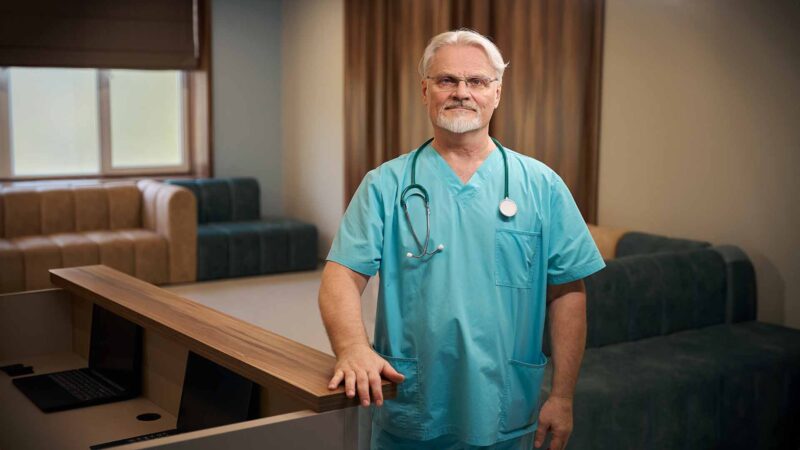WORKING IN PRACTICES WITH CONTRASTING POPULATION NEEDS AND ALTERNATIVE FUNDING MODELS GP runs population relay between practices
People In Health Care Series
Dr Jaspreet Saini, GP
Clinic Director, Healthicare &
Practice Owner and Principal GP, Rosedale Medical Practice
Filmed in Rooty Hill, New South Wales | October 2024
Dr Jaspreet Saini is a GP with a decade of experience, practicing in West Pennant Hills and Rooty Hill, New South Wales. He began his medical journey at Monash University, followed by internships and residency at Blacktown Hospital, in Western Sydney. Instead of confining himself to a single specialty, he pursued general practice to explore various facets of medicine.
His career philosophy centres around addressing frustrations within the healthcare system and advocating for multidisciplinary care. This commitment led him to travel to the United States, where he studied diverse healthcare models, particularly in underserved areas. Recognising the potential for improving primary care in Australia, he and his wife purchased a practice in West Pennant Hills in 2019, which has since received multiple awards for its innovative care approach.
However, Dr Saini felt a strong urge to work in a more underserved community to tackle health equity issues. He has been actively involved in a clinic in Rooty Hill since February 2024, focusing on redesigning healthcare delivery in an area characterised by socio-economic challenges and high rates of chronic conditions like obesity and diabetes.
His typical workweek has evolved to blend clinical practice with leadership and management. Three days a week, he coaches healthcare teams, guiding GPs, nurses, and medical assistants to enhance their clinical skills. Additionally, he engages in research related to health equity and models of care, seeking grants and writing papers.
Collaborative partnerships are pivotal to his approach. In Rooty Hill, his practice works closely with organisations like the Western Sydney Diabetes team, adopting proactive strategies to manage patients’ chronic conditions effectively. Through teamwork, they aim to provide holistic and efficient care, recognising that silos within healthcare hinder optimal outcomes.
You Might also like
-
State of private healthcare in Australia
Australia’s healthcare system is often described as a mixed system, with a combination of public and private providers. While public healthcare through Medicare provides universal coverage for essential services, private healthcare offers additional options and amenities for those who can afford them.
Private Healthcare Australia (PHA) is the Australian private health insurance industry’s peak representative body that currently has 21registered health funds throughout Australia and collectively represents 98% of people covered by private health insurance. PHA member funds today provide healthcare benefits for over 14 million Australians.
-
Sharing the same goals in value-based procurement
Value-based procurement (VBP) is a journey, not a sprint. It’s about putting the patient at the centre of quality affordable healthcare through changes in procurement practices for medical technologies. Patient outcomes drive value and sustainability, not just price. The bigger picture indicates that VBP will create system cost saving through benefitting patients, rather than trying to attain the reverse – a win-win outcome.
-
Getting the conversation going on the connection between oral health and chronic conditions
Dr. Carol Tran is an Oral Health Therapist and co-founder of Oral Health Home, an organisation focused on innovative, prevention-oriented oral health education and outreach. She is a Past President of Dental Hygienists Association of Australia (DHAA) and currently is the Scientific Program Chair, for upcoming congress in October 2025, for the newly formed Oral Health Association of Australia (OHAA).



